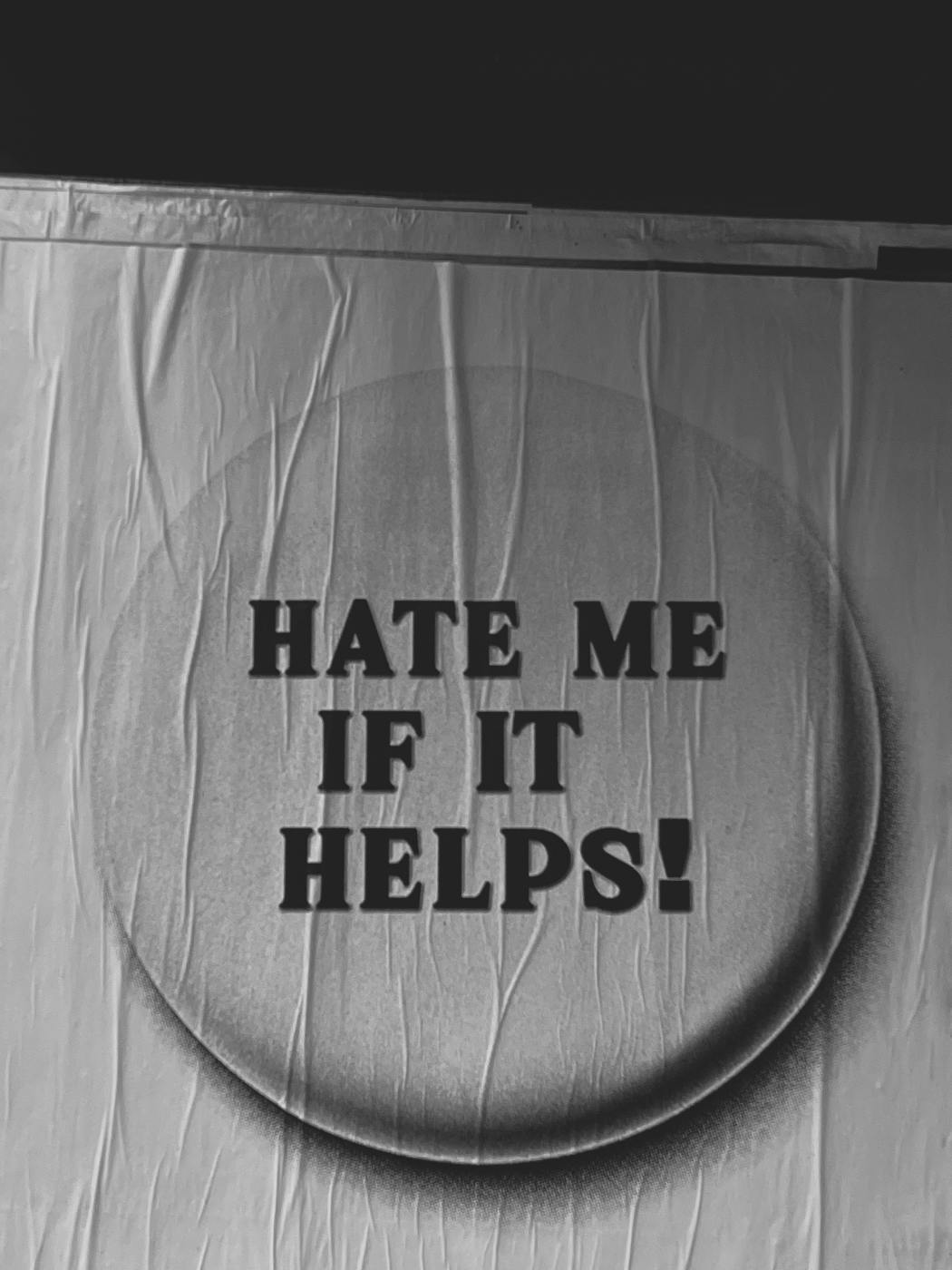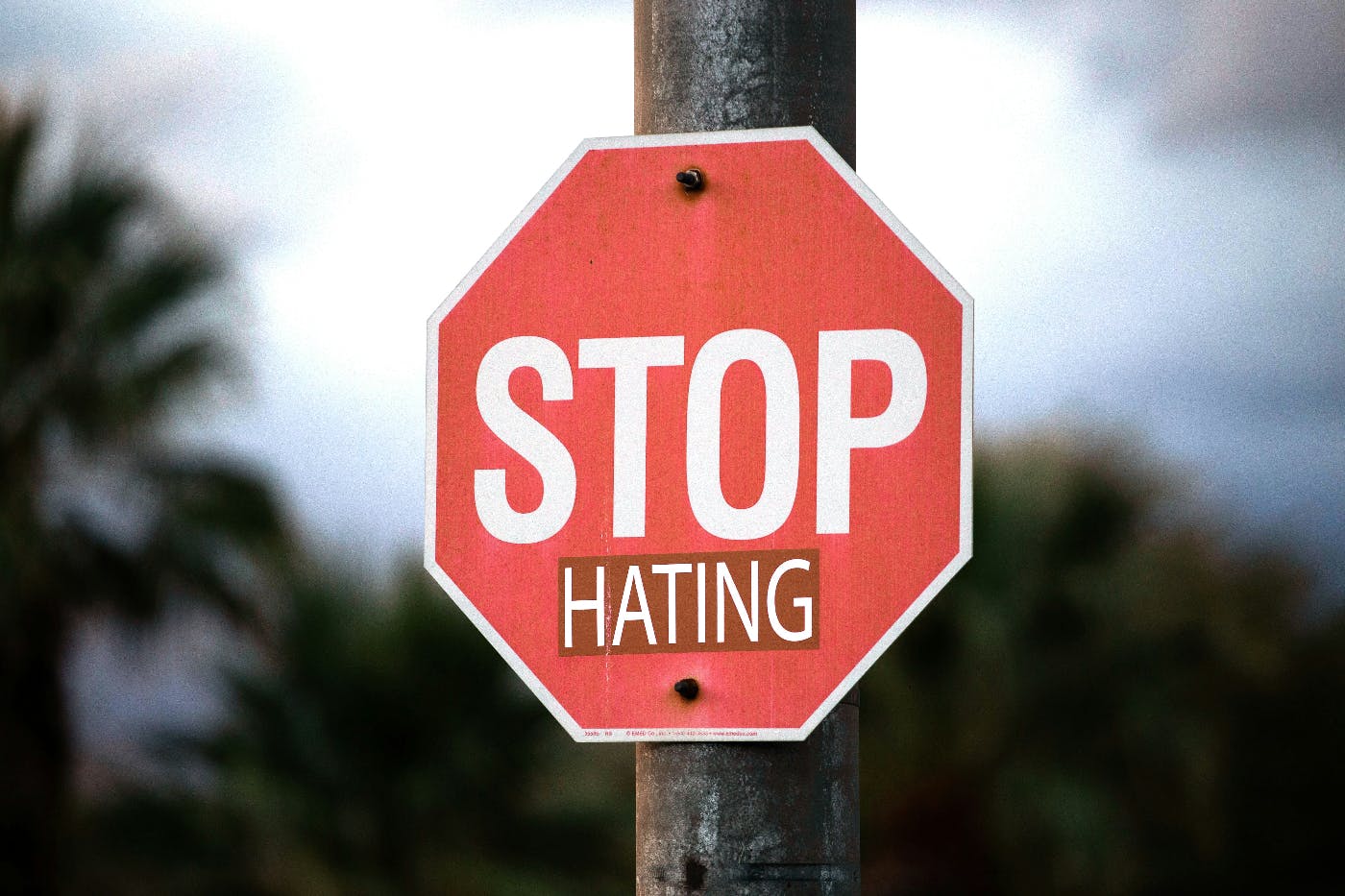
Hate is a complex emotion that can be deeply ingrained in our psyche. It can stem from fear, ignorance, and a fundamental misunderstanding of others.
I have been thinking about this topic for a long time now and am unsure how to approach it. I do not want this to be a political screed, but something needs to be said about the hate that is flying around the country right now. Hate is not good for many reasons, and when it becomes strong enough and loud enough to define how you interact with others daily, it cannot be hidden. When you harbor such intense animosity toward everything and everyone who doesn’t look, think, or act like you, you risk becoming defined by your hate. You can become literally full of hate. Before that happens and your life becomes entirely characterized by this negativity, it’s time to stop, rethink, and readjust how you engage with the world, seeking to shed all that hate.
This, again, is not about politics, who to vote for, or who said what about anything. This is a reaction to the anger I see at Walmart, at the casual racism that is getting a pass more and more. This is about the people I see walking down the street who are just seething with hate and feel like it’s okay to spew their untethered hatred at everyone.
Hate isn’t new, but lately, it feels more dominant and present, and it is causing emotional destruction. I want to look at this, however, briefly and see if we can start a conversation that will lead us to abandon hate for understanding and harmony.
Sound good? Then, let’s get to it.
Understanding Hate
Hate is a complex emotion that can be deeply ingrained in our psyche. It can stem from fear, ignorance, and a fundamental misunderstanding of others. At its core, hate often arises from a perceived threat—whether it’s to one’s identity, beliefs, or way of life. It can manifest in various ways: verbal hostility, discrimination, and even violence. Yet, beneath the surface, hate is a reflection of our fears and insecurities.
For example, consider a person who has grown up in a homogenous community. They may feel threatened if they are suddenly confronted with individuals from different backgrounds or cultures. This fear can morph into hatred—a defense mechanism that allows them to shield themselves from perceived differences. They may convince themselves that they are superior, and in doing so, they dehumanize others. This mindset not only harms those who are targeted but also traps the individual in a cycle of negativity that limits their ability to connect with the world around them.

The Cycle of Hate
Hate can perpetuate itself in a vicious cycle. When individuals harbor hate, they often become closed off to new experiences, ideas, and people. They create echo chambers where their views are reinforced, making breaking free from this cycle difficult. As hatred festers, it breeds contempt and a desire to lash out. This behavior can become habitual, leading to a lifestyle defined by animosity.
The consequences of this cycle extend beyond the individual. When people express hate, it can ripple through communities, fostering division and conflict. Relationships break down, and communities become polarized, making it increasingly challenging to bridge the gaps between different groups. The more we allow hate to thrive, the more isolated we become, further entrenching ourselves in our respective divisions.
Consider the impact of hate speech on social media. What starts as a single hateful comment can escalate into a barrage of negativity, influencing others to join in. The anonymity of the internet can embolden individuals to express sentiments they might otherwise suppress in face-to-face interactions. This online culture of hate can seep into our offline lives, affecting how we view and treat others in our daily interactions.
Impact on Relationships
Hate affects those on the receiving end and has profound implications for those who harbor such feelings. When we allow hatred to dictate our thoughts and actions, we risk isolating ourselves from our friends, family, and community. Relationships are built on trust, understanding, and empathy; hate erodes these foundations.
Imagine a friendship that becomes strained due to differing political beliefs. If one person allows their animosity toward the other's views to overshadow their relationship, they may become hostile or dismissive. Over time, this can lead to a breakdown in communication and understanding. Instead of engaging in meaningful conversations, they may resort to insults or avoidance. The relationship suffers, and both parties lose the opportunity to learn from each other.
Moreover, the emotional toll of hate can be exhausting. Harboring resentment and anger drains our energy, leaving little room for joy, love, and connection. It creates a cycle of negativity that can affect our mental health, leading to anxiety and depression. As we become consumed by hatred, we lose sight of the beauty and diversity life offers.
Strategies to Overcome Hate
To break free from the chains of hatred, we must actively seek to understand ourselves and the world around us. Here are some practical steps individuals can take to combat hate within themselves:
- Self-Reflection: The first step in overcoming hate is self-reflection. Take the time to examine your feelings and beliefs. Ask yourself why you feel the way you do about certain groups or individuals. Are these feelings based on personal experiences, societal influences, or fear of the unknown? Understanding the root of your emotions is crucial in dismantling hatred.
- Education: Knowledge is a powerful antidote to hate. Educate yourself about different cultures, perspectives, and experiences. Read books, watch documentaries, or engage in discussions with people from diverse backgrounds. Learning about others can foster empathy and understanding, helping to break down the barriers that fuel hatred.
- Community Engagement: Get involved in community initiatives that promote understanding and acceptance. Volunteer for organizations that focus on social justice, diversity, and inclusion. By actively engaging with individuals from different backgrounds, you can challenge your assumptions and foster meaningful connections.
- Practice Empathy: Try to put yourself in others’ shoes. When faced with someone whose beliefs or actions you disagree with, take a moment to consider their perspective. What experiences might have shaped their views? This practice can help cultivate compassion and reduce the tendency to judge others harshly.
- Choose Kindness: Make a conscious effort to respond to hate with kindness. When confronted with negativity, choose to engage in positive dialogue rather than retaliating. Small acts of kindness can have a ripple effect, encouraging others to do the same.
- Seek Support: Surround yourself with individuals who encourage positive dialogue and understanding. Seek out supportive communities where you can discuss your feelings and experiences openly. Sharing your journey with others can provide valuable insights and encouragement.

Personal Responsibility
Ultimately, we must recognize our personal responsibility in choosing love and understanding over hate. It is easy to succumb to the allure of hatred, especially in a world that often seems divided. However, we have the power to shape our own perspectives and influence those around us.
It is essential to be mindful of our words and actions. We should strive to promote understanding rather than division when we engage in conversations. This means actively listening to others, acknowledging their experiences, and seeking common ground. Instead of dismissing differing viewpoints, we can approach them with curiosity and a desire to learn.
Moreover, we must hold ourselves accountable for our feelings. If we find ourselves feeling hate toward a particular group, we should take a step back and question why. Are we basing our feelings on personal experiences, media portrayals, or societal narratives? By examining our beliefs critically, we can challenge biases and seek a more nuanced understanding of others.
Summing Up
As we navigate a world that seems increasingly defined by hatred, it is essential to reflect on our own feelings and behaviors. Hate does not exist in a vacuum; it affects us all. By acknowledging the roots of our animosity, engaging in self-reflection, and actively seeking to understand others, we can break free from the chains of hatred.
Let us choose to replace hate with understanding and compassion. Every small step we take toward fostering empathy can create a ripple effect, encouraging others to do the same. In a world that often feels divided, we must promote connection and understanding. Together, we can create a more compassionate and inclusive society, one act of kindness at a time.
ThoughtLab is Hate-Free
At ThoughtLab, we pride ourselves on being a hate-free company that embraces the rich tapestry of diversity found within our team. Our workforce is a vibrant blend of individuals from all corners of the globe, representing a myriad of backgrounds, cultures, religions, and political beliefs. This diversity is not just a statistic but the foundation of our innovation and creativity.
We are committed to fostering an inclusive environment where every voice is heard and valued. In our workplace, there is no room for hate; instead, we cultivate a culture of respect, understanding, and open dialogue. This commitment strengthens our internal community and enhances our ability to serve our clients with fresh perspectives and insights.
We believe that our differences are our greatest strengths, and by celebrating them, we can drive positive change in our company and the world around us. Together, we create a space where empathy and collaboration thrive, empowering each employee to contribute to a more inclusive future. At ThoughtLab, we stand united against hate, championing the values of compassion and understanding in all we do.

